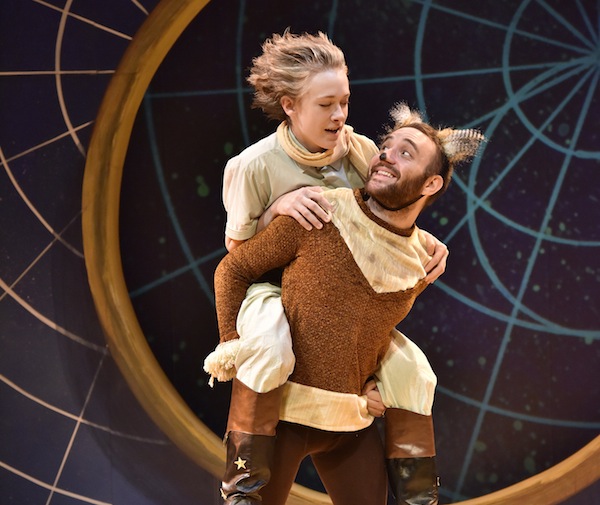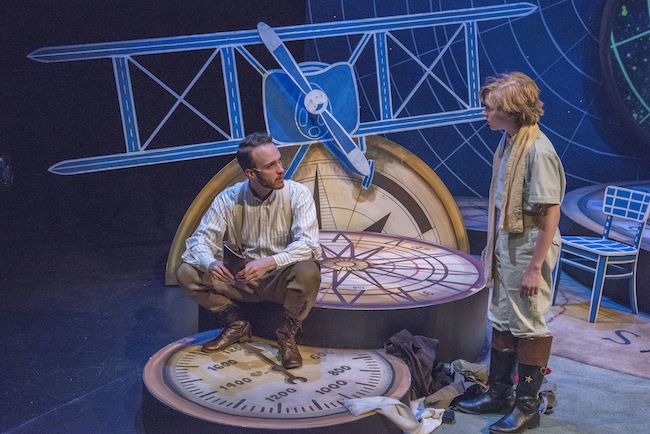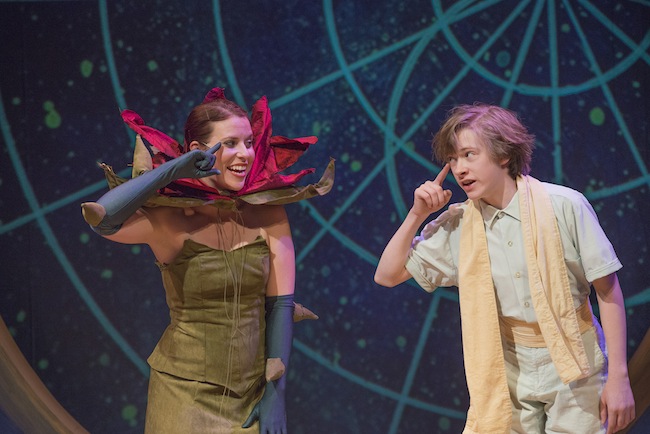Theater Review: “The Little Prince” Dazzles at The New Rep
If you want to expand your heart and mind this holiday season, you couldn’t do better than go to The Little Prince.
The Little Prince, based on the book by Antoine de Saint-Exupéry. Music, Rick Cummins. Book and lyrics, John Scoullar. Directed by Ilyse Robbins. Music direction by Todd C. Gordon. Staged by New Repertory Theatre at the Charles Mosesian Theater in the Arsenal Center for the Arts, Watertown, MA, through December 21.

Wil Moser (The Little Prince) and Andrew Barbato in the New Rep production of “The Little Prince.” Photo: Andrew Brilliant/ Brilliant Pictures.
By Lin Haire-Sargeant
This musical version of The Little Prince is an extraordinarily faithful transmutation to the stage of writer-aviator Antoine de Saint-Exupéry’s floating, magical novel of the same name. First published in France in 1943 during the darkest days of the Second World War, the slim volume with its spare, witty line drawings and philosophical tone acknowledges suffering yet transcends it: life may end but beauty and friendship endure. In the seven decades since its publication, child and adult readers have sworn by the book and even lived by it. The compelling New Repertory Theatre production of the songfest features a memorably beautiful set and a buoyant performance by Wil Moser as the Prince.
The plot is easily told. A lone aviator crash-lands his plane in the Sahara desert and desperately attempts to repair it before he runs out of water. He is interrupted by the inexplicable appearance of a beautiful blond-haired boy in an Imperial overcoat asking him to draw a sheep. As Saint-Exupéry says, “When a mystery is too overpowering, one dare not disobey.” So the Aviator draws a sheep and the strange friendship begins. The Little Prince tells his story; his home is a small planet of which he is the sole inhabitant. His main duties had been to clean the chimneys of his three volcanoes and keep the baobab trees in check — until a beautiful Rose sprang up from the soil. The Little Prince devoted himself to her care but, eventually overwhelmed by her demands, he left to explore other planets and meet their king-caretakers. Then he landed in the Sahara and encountered the Aviator. The slow courtship between the naïve Prince and the chronic-loner Aviator becomes the focus of the story. Will they become friends before each finds a way home?

L-R: Nick Sulfaro (Aviator) and Wil Moser (The Little Prince) in the New Rep production of “The Little Prince.” Photo: Andrew Brilliant/Brilliant Pictures.
The four-actor ensemble is grounded in the astonishingly pure performance of Wil Moser as The Little Prince. Only a freshman in high school, Moser’s disciplined restraint conveys the quiet power of the Little Prince perfectly. His vocal delivery, without indulging in throat-catching sentimentality, expresses the joy and solemnity of the Prince’s presence in the universe. It also conveys the price of the terrible choice he must make. Yet Moser’s characterization comes off as light as an eiderdown feather sailing through a sunbeam.
As the Aviator, Nick Sulfaro seems to be channeling Saint-Exupery, who was a flying ace called St. X by his comrades in the French Air Force. Sulfaro brings the right amount of swagger, irritability, and dawning consciousness of life’s complexity to a role that walks the tight-rope between tragedy and whimsy. In the production’s striking opening scene, he explains his penchant for the lone and lonely skies: he “flies” a scale-model biplane on a long supple pole to dramatize the initial desert crash. His is the voice that keeps the narrative moving, alternately addressing the audience and conversing with the Prince. Sulfaro’s singing delivery is initially flat and declamatory, conveying his rejection of human connection. Straight man to the eccentricities of the other characters, he is slowly drawn into appreciating the need for human connection. Sulfaro’s increasingly expressive vocals reflect the Aviator’s realization that the Little Prince’s exile mirrors his own isolation. In a poignant moment near the end of Act One, he reaches out to keep the Prince from leaving: at the instant of contact the boy runs away.
During Act Two the Prince’s and the Aviator’s needs become more urgent—both are becoming very thirsty and the Little Prince is increasingly worried about the fate of the Rose (Laura Jo Trexler) back on his planet. Trexler best shows her talent in some hilarious cameos as anonymous, flibbertigibbet flowers. These serve to highlight the depth of the Prince’s love for his abandoned Rose. When portraying Rose, Trexler knocks the production off balance: she embraces, almost immediately, the annoying, shrewish side of the role without allowing us to experience the sumptuous beauty that makes the Prince love his Rose. Perhaps the production was counting (too much) on the aesthetic impact Trexler would make in her lovely Rose costume (designed by Chelsea Kerl).
In contrast to the seriousness of the explorers’ dilemmas, Andrew Barbato provides nimble comic relief. His physical adroitness and superb comic timing galvanize his portraits of the utterly absurd planet kings. His Conceited Man is a particular delight; he vamps in front of mirrors and shamelessly begs for compliments and audience applause during the show’s best number, “Admire Me.” Yes, Barbato’s interpretation of the role of the Fox might be a bit over the top, with too much manic snorting and yipping, but the approach makes the character’s taming by the Prince all the more striking. By disciplining the Fox, the Prince learns that caring for your partner is essential to love — admiration is not enough. This lesson strengthens his resolve to return to his Rose.

L-R: Laura Jo Trexler and Wil Moser (The Little Prince) in the New Rep production of “The Little Prince.” Photo: Andrew Brilliant/ Brilliant Pictures
The set (designed by Matthew Lazure) is a real eyeful, easily sparking visions of deserts and planets in the imagination of viewers. A dozen disc-shaped platforms of various sizes painted as compasses and clocks suggest hills and horizons. A huge perpendicular disc at the rear of the stage doubles as a projection screen for the Aviator’s drawings and a portal to a metaphysical realm. The largest floor disc has secret panels that open for the Prince’s volcano fires and baobab trees. Director Ilyse Robbins makes excellent use of visual storytelling techniques, deploying characters in a fantastical set transports us to strange and wonderful worlds.
Ironically, the music (by Rick Cummins) is not quite the right match for The Little Prince. Some of the songs are emotionally expressive, but too many offer an easy reassurance that goes against the expanse (spiritual and spacial) at the heart of the story. Only Todd C. Gordon’s solo piano stylings communicate the wonder of wind, sand, and stars that the Little Prince—and Saint-Exupéry—sought in their universe.
In 1944, author “St. X” disappeared forever. He was flying a lone mission for the Allies in his plane over the Mediterranean. Perhaps Saint-Exupéry went out like his Little Prince: “He did not cry out. He fell as gently as a tree falls. There was not even any sound.” But The Little Prince is far from silent, as this powerful New Rep staging, filled with pathos and humor, proves.
Lin Haire-Sargeant directs the MassArt Playwriting Workshop, which gathers Boston-area playwrights and actors together every two weeks to read and critique new work. A novelist (H.—The Story of Heathcliff’s Journey Back to Wuthering Heights) and playwright (Dead; Green Pastures), Lin is Professor of Literature and Writing at Massachusetts College of Art and Design.
Tagged: Antoine de Saint-Exupéry, Ilyse Robbins, Lin Haire-Sargeant, New Repertory Theatre, The Little Prince
